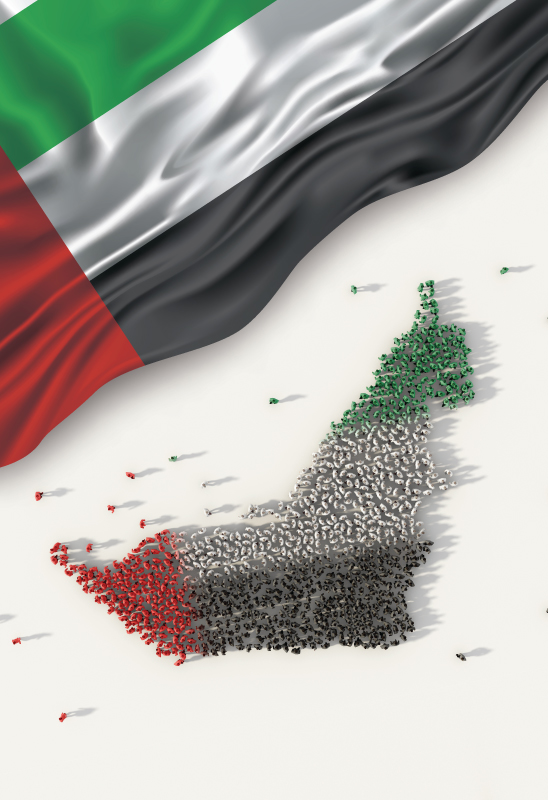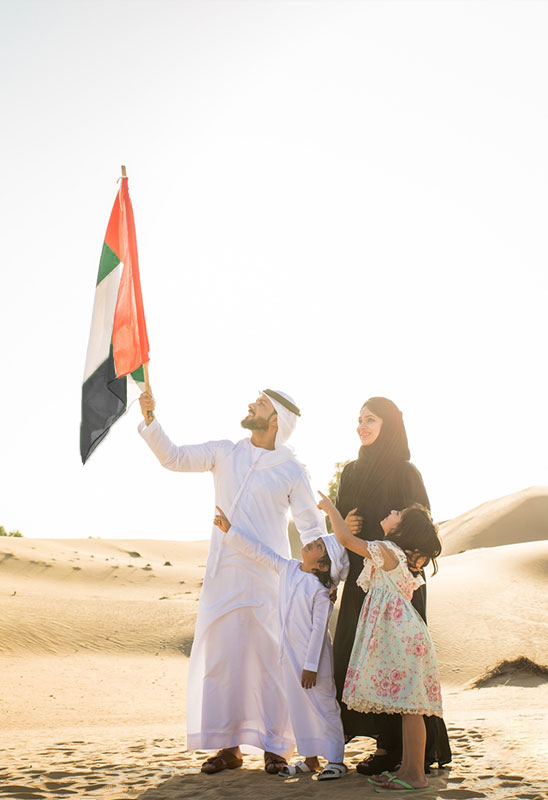

Human Rights
Knowledge of rights contributes to strengthening the human rights and human rights approach in the United Arab Emirates to form a balanced and integrated model based on enhancing the enjoyment of fundamental rights and freedoms, respect for the rule of law, ensuring justice, equality and non-discrimination, addressing any abuses or violations, and following up on taking the necessary measures to address them and ensure their non-recurrence.
The Constitution of the United Arab Emirates guarantees all basic rights and freedoms, and the National Human Rights Institution monitors all abuses that fall within the framework of the state's guarantee of human rights and freedoms, receives complaints about them, and takes what is necessary to follow up and treat them, and works to end any case of abuse or infringement of rights Human rights and fundamental freedoms are guaranteed by international and national laws by the various available legal means.
The National Human Rights Institution is also responsible for informing all members of society of their rights guaranteed by law in the United Arab Emirates, the applicable laws, and relevant international charters and covenants, and assisting them to take measures that ensure that these rights are preserved and protected in the event of any violation of them.


What Are Human Rights?
Human rights are a package of rights and freedoms inherent to all human beings. They have been advocated by the international community, which is expressed in the Universal Declaration of Human Rights issued by the United Nations in 1948, and confirmed by (International Covenant on Civil and Political Rights), and (International Covenant on Economic, Social and Cultural Rights), and through a wide range of agreements and charters that are concerned with promoting respect for and compliance with these rights and freedoms by all countries, as a way to defend and guarantee human rights worldwide.
Most countries and international communities show great interest in human rights, in the matter of safeguarding the human dignity of all human beings. They have become an essential part of these countries' sustainable civilization, which can be continuously advanced according to civil, political, and civilizational developments.
The international community perceives human rights as one of the most fundamental pillars, where everyone is equal in rights, freedoms, and dignities as universal, inalienable, synergistic, indivisible, equal, and non-discriminatory rights. Human rights were established in accordance with legal rules and international instruments concerned with human rights, in a manner that represents the international legitimacy of human rights.


Human Rights In The UAE
The United Arab Emirates recognises well the importance of activating the human rights system, and has emphasized it since the establishment of its constitution, in a manner that expresses the vision of its civilization and its laws that guarantee all basic rights and freedoms for all, and are compatible with its legislative system that promotes justice, equality tolerance, and consistent with the principles of the Universal Declaration of Human Rights adopted by the United Nations General Assembly.
The UAE has acceded to many international instruments and conventions and became a major part of the efforts concerned with promoting and protecting human rights in the world.
The UAE was a member of the United Nations International Human Rights Council, for two sessions. In 2021, it was elected as a member of the same council for a third term, extending from 2022-to 2024.
As a culmination of its wise policies in safeguarding all human rights and freedoms, the United Arab Emirates established the National Human Rights Institution, upon Federal Law 12 of 2021, as an independent entity that operates in line with the Paris Principles to promote and protect and human rights and monitor human rights principles, through an integrated system compatible with the laws in this field.
The NHRI work is being guided by a set of international standards that regulate and direct the work of National Human Rights Institutions.
NHRI strives to build effective international and regional partnerships, and qualitative educational programs to achieve the aspirations of the Emirati society, so as to reflect the human relationship between the country and its people.
FAQs
The NHRI is an independent entity that enjoys financial and administrative independence in the exercise of its functions, activities, and competencies and aims to promote and protect human rights and freedoms, under the provisions of the Constitution, laws, and legislation in force in the UAE and relevant international charters, covenants and agreements.
The National Human Rights Institution was established in the year 2021, according to the Federal Law 12 of 2021, as an independent national institution operating per the “Paris Principles.”
In parallel, the presidential Decree No. 21 of 2021 was issued regarding the formation of the board members, so they carry out their duties and responsibilities guaranteed by federal law. The board members represent an elite group of experts and those concerned with human rights, according to a wide range of diversity and plurality of experiences and qualifications that contribute to strengthening the work of the NHRI, taking into account the representation of women and all relevant groups.
Article 5 of the Federal Law 12 of 2021 of the National Human Rights Institution defines a set of specialized tasks that contribute to achieving its objectives, including:
• Spreading the culture of human rights, educating members of society about it, and issuing bulletins, publications, statements, and special reports related to human rights and their activities.
• Conducting field visits to penal and correctional institutions, places of detention, labour gatherings, health and educational homes and shelters, and monitoring the human rights situation there.
• Follow-up and coordination with the competent authorities to respond to the observations received by the UAE government from international organisations in the field of human rights.
• Receiving and estimating complaints related to human rights in accordance with the approved standards, and taking the legal procedures in this regard.
• Monitoring any violations of human rights, verifying their validity, and reporting them to the competent authorities.
The NHRI works effectively and efficiently to protect and promote human rights in the United Arab Emirates, through an integrated legislative system that is compatible with local laws and international legislation, and through building effective partnerships and programs with all actors, disseminating and promoting a qualitative societal culture with human rights values and principles, receiving and addressing all complaints and suggestions to achieve the ambition of society.
The NHRI is committed as well to the highest standards of privacy in the performance of its work on human rights.
Soon, the National Human Rights Institution will make it possible to communicate with it through its various channels to benefit from its services in the field of human rights, including (e-mail, phone calls, and the communication form on the website).
The headquarters of the National Human Rights Institution is located in the capital, Abu Dhabi, and Article (II) of the Commission's law allowed the opening of branches and the establishment of offices in other emirates.
All citizens, residents and visitors in or connected to the UAE have the right to submit complaints and proposals related to human rights to the National Human Rights Institution so that the Institution considers all complaints and proposals it receives, in accordance with the legal and regulatory procedures and requirements for each of them, and it must study all complaints and proposals in terms of seriousness, credibility, safety, and alignment.
In the event of human rights violations, the services (submission of complaints) and (submission of information) will be available soon for this purpose. In the event that the violation is urgent, it is recommended to communicate with the state agencies concerned with the protection and application of law and order on phone number 999 or through the various available and relevant communication channels.
The National Human Rights Institution has a number of coordination and cooperation mechanisms with all state agencies, enabling it to view and address these complaints.
The NHRI is not competent to consider requests for financial, material, or non-human rights assistance. Accordingly, NHRI recommends that such requests be forwarded to the concerned authorities or to charitable societies and competent civil authorities operating in the country.
Being an independent entity, the NHRI does not accept donations except entities within the UAE that are approved by the board members.
NHRI has the following financial resources that enable it to carry out the work:
- The annual appropriations allocated by the UAE government to the NHRI from the general budget.
- Grants, donations, bequests, and endowments provided by entities within the UAE and approved by the members of the board members.
- Other revenues generated by the NHRI from the practices of its activities.
Those who are specialized in the field of human rights or executive positions concerned with the competencies of the organisational units in the NHRI are entitled, without discrimination, to apply for a job vacancy. Accordingly, kindly visit the “Join Us” section available on our website.